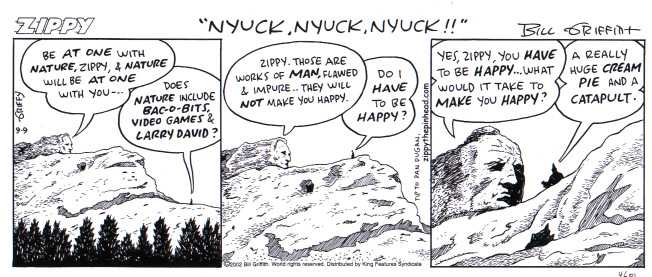. . .

Another Stereotype of the Month entry:
JODI RAVE LEE: Crazy horse's name misused, abused in Las Vegas
A bit of Indian Country persona has found its way into the swarm of Vegas chutzpa — by hook or by crook. So there was the Crazy Horse name on a marquee above a topless club's flag-draped entrance.
Crazy Horse — Tasunke Witco — is not a figment of someone's imagination. He is one of the most revered Lakota warriors and spiritual leaders in Native history. He led the charge against Lt. Col. George Armstrong Custer at the Battle of the Little Bighorn in 1876.
More than a century later, Crazy Horse has not gone quietly into the night. He remains a beloved man among Lakota people. Unfortunately, throughout the years he also is appealed to those trying to make a buck.
Last week, his name was slapped across the front page of the Las Vegas Review-Journal. And woe unto thee, he was not in good company.
The tag-along entourage? Thugs. Thieves. Drug pushers. Corrupt ex-cops.
The newspaper's big headline: "Raid looks for mobster link."
The photo: FBI agents, under the Crazy Horse marquee, stood near short-skirted women and police cars.
The Review-Journal quoted an attorney: "For years, the management and ‘security' staff of the Crazy Horse has been infested by a rogues' gallery of thugs. … All of this has nurtured a culture of violence marked by robberies, beatings and even death."
The club's use of Crazy Horse's name was yet another reminder of mainstream society's romanticized image of Native people. And it is yet another example of how Native images continue to be abused and misappropriated by sports teams, auto and RV makers and carpet companies.

Rob's comment
I wouldn't say the Crazy Horse nightclub is taking advantage of a romanticized vision of Indians. The reason these companies appropriate the name "Crazy Horse" is because it suggests frenzied, out-of-control danger. That's kind of what you want for powerful alcohol, cutting-edge fashion, or a topless club: the notion that this entity can set your inner animal, your wild side, free.
In other words, the nightclub exploits the idea of Indians as savages. Even though Crazy Horse wasn't known for being savage, his name sounds savage. If his name had been Crazy Bear, things would be even worse. You'd see his name plastered everywhere. But if it had been Quiet Horse, you wouldn't see it at all.
As I've said before, if someone came up with a Crazy Horse bathroom tissue, it might be offensive, but I don't think it would be stereotypical. Associating Crazy Horse with something soft and pliant is the antithesis of the stereotype. That's why it's unlikely to ever happen.
Related links
Savage Indians
|
. . . |

|
All material © copyright its original owners, except where noted.
Original text and pictures © copyright 2007 by Robert Schmidt.
Copyrighted material is posted under the Fair Use provision of the Copyright Act,
which allows copying for nonprofit educational uses including criticism and commentary.
Comments sent to the publisher become the property of Blue Corn Comics
and may be used in other postings without permission.